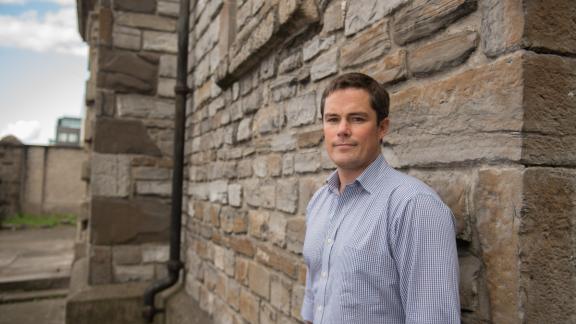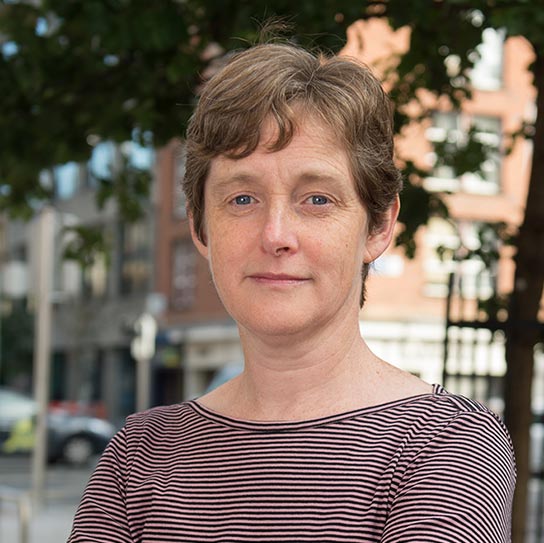Dr Mark Murphy
GP, Doctors for Choice

I qualified as a doctor 13 years ago and I've been involved in reproductive rights issues for about a decade. I got involved after I researched the experiences of Irish women in crisis pregnancy. I was so shocked it led me to join Doctors for Choice.
The constitutional prohibition of abortion, which is that recognizing that at any time after conception fetal products are equal in terms of rights to life than that of the pregnant woman, for Doctors created an impossible situation when managing severe clinical risk and illness in pregnant women. At what point when a woman is becoming unwell can you say it’s life-threatening?
In 2013 there was the Savita case. A happily pregnant woman who unfortunately miscarried at 18 weeks. The obstetric team treating her said that they could not act because there was a fetal heartbeat. She was bleeding and in pain and they said, ‘I'm sorry, the fetal heartbeat will stop and then we will act. Your illness is not real and substantial enough.’
Unfortunately, by the time the heartbeat stopped it was too late. Sepsis had kicked in and Savita died. It is undisputable and has been found to be the case in medical inquiries after the event, that the eighth amendment was a major contributory factor to her death.
One of the biggest tragedies is that for three months of the campaign you’d turn on the radio and hear cases upon cases of women and couples talking about how the eighth amendment had harmed them.
The eighth amendment was a Catholic social policy that was directly inserted into our Constitution in 1983. At that time the Catholic Church and the Vatican were concerned about developments like Roe v Wade and the legalization of abortion laws around Europe. And they thought Ireland could be an example to the world of how you could put in a pro-life anti-abortion clause in an amendment to the Constitution. But there were numerous examples of how this grey ambiguous wording would lead to catastrophic experiences and harm to Irish women. One of those examples happened in 1992 when a young girl was raped and became pregnant, and in the High Court interpretation of that amendment, she was denied a termination of pregnancy.
It was not until 2013, 21 years later that the legislation changed to allow doctors to act if there was a real or substantial risk to the woman's life. But all that did was create this impossible situation for doctors who would literally have a copy of the Constitution at the bedside. Do I treat this patient, or do I fall foul of the law? That’s anathema to patient care. It imposed professional misconduct upon doctors who wanted to provide compassionate, evidence-based care. It was unconscionable.
The facts of the matter are represented in every international guideline. The United Nations, The World Health Organization, every international obstetrics and gynaecology association guideline on crisis pregnancy sexual reproductive health states that women should have safe accessible access to abortion care. So, how could we justify a constitutional prohibition on abortion?
What made it so uniquely damaging and harmful was that at a time of crisis it forced women abroad to access healthcare. Many of these women did not have money, they did not have work, they were socially isolated, and they felt shame. Shame endorsed by the state.
I know that not only from the statistics but from my own personal experience in caring for women. A woman might find out at six weeks that she is in a crisis pregnancy and she might become aware quite quickly let's say at seven weeks that she's certain that termination is the best decision for her or her family. And instead of receiving care at seven weeks from me, she will receive care at 10 weeks from a clinic in the United Kingdom when she's organized her child care, got time off work, when she's able to gather enough money to book a hotel and flights. Or she can’t afford a hotel and she has to travel back bleeding on the plane. That's just not right. She doesn't have agency and autonomy to choose when that procedure can happen. Now when the law changes Irish women will be enabled to have earlier terminations.
And of course, not all women could travel so that left many women having to take illegal abortion pills alone at home. I know of one case in which an asylum seeker came to her GP because she was raped and wanted an abortion. And all the GP could say was, ‘I'm sorry I can't help you. You have to travel abroad.’ But she was an asylum seeker, so she wasn’t legally allowed to travel. I just remember thinking, ‘This is so wrong, it's so wrong.’
It was the ultimate hypocrisy. It was designed to prevent abortion and it did not do that. Instead, it actively harmed so many women in Ireland. So many women were affected by it and I think that's why there was an overwhelming two-thirds majority that voted out the eighth amendment.
But it was just accepted as part of our culture. I think one of the main changes was when people began to think differently was when the European Court of Justice called it inhumane and unjust to women. And during the referendum campaign, this multitude of evidence came before the Irish people. One of the biggest tragedies is that for three months of the campaign you’d turn on the radio and hear cases upon cases of women and couples talking about how the eighth amendment had harmed them. But it is a credit to those brave voices that they told their stories and changed minds to vote Yes. Ireland is in a different place now, we live in a more understanding world. We understand some truths are not simple, every woman’s story is complex.
Repealed the 8th: Ireland’s Abortion Referendum
from the Center for Reproductive Rights
when

















